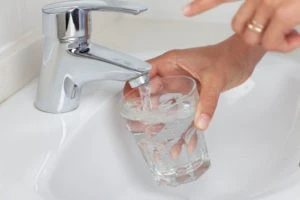
Camp Lejeune water contamination symptoms are associated with various diseases and medical conditions officially linked to the toxic chemicals in the base’s water supply. Specifically, any cancer symptoms can also be signs of Camp Lejeune contamination if you or a loved one developed them after spending at least 30 days at the U.S. Marine Corps base in Jacksonville, N.C., between Aug. 1, 1953, and December 31, 1987.
- VA Recognizes Specific Cancers Linked to Water at Camp Lejeune
- Other Conditions Linked to Camp Lejeune’s Contaminated Water Supply
- What Can I Do If I Think I Have Symptoms of Camp Lejeune Contamination?
- Our Lawyers Can Lead Your Camp Lejeune Water Contamination Case
- Call Us: Your Camp Lejeune Symptoms Could Mean You Have a Water Contamination Case
VA Recognizes Specific Cancers Linked to Water at Camp Lejeune
The U.S. Department of Veterans Affairs (VA) offers disability benefits to Camp Lejeune survivors and those who served at Marine Corps Air Station (MCAS) New River in North Carolina and have any of the following conditions:
- Adult leukemia
- Bladder cancer
- Kidney cancer
- Liver cancer
- Multiple myeloma
- Non-Hodgkin’s lymphoma
Cancer Symptoms Vary, but Any Medical Concern Should Lead to a Doctor’s Visit
Per the National Cancer Institute (NCI), cancer can cause many symptoms. Generally, it advises that you see a doctor if your symptoms do not improve after a couple of weeks. Given the potential seriousness of some of the symptoms listed below, we suggest seeing a doctor as soon as possible. Specific cancers cause symptoms unique to different parts of the body. But overall, any of the following could indicate cancer:
- Bladder changes, such as having trouble urinating or pain when urinating and blood in the urine
- Bleeding or bruising for no apparent reason
- Bowel changes, including blood in the stool or bowel habit changes
- Breast changes, including lumps, itchy, red, dimpled, or puckered skin
- A cough or persistent hoarseness
- Nausea, vomiting, or pain after eating
- Appetite changes
- Abdomen changes
- Chronic fatigue
- Fever or night sweats
- Headaches
- Changes in hearing and vision
- Seizures
- Sores that do not heal
- Skin changes (such as skin that is dry and itchy)
- Jaundice (yellowing of the eyes and skin)
- Lumps and swelling, particularly in the neck, stomach, groin, or underarm area
- Unexplained weight loss or weight gain
NCI notes that many other sources, such as illness, injury, or benign tumors, can cause these symptoms. However, as mentioned earlier, see a medical professional promptly to identify problems early. Also, you should not wait until you feel pain or discomfort before going to a doctor. Cancer does not always cause pain, NCI advises.
For a free legal consultation, call 516-932-0400
Other Conditions Linked to Camp Lejeune’s Contaminated Water Supply
In addition to the cancers listed above, you might be eligible to file a claim under the Camp Lejeune Justice Act of 2022 if you spent time at Camp Lejeune during a specified period and have any of the following medical conditions:
- Aplastic anemia or other myelodysplastic syndromes
- Parkinson’s disease
- Birth defects
- Breast cancer
- Esophageal cancer
- Female infertility
- Hepatic steatosis
- Lung cancer
- Miscarriage
- Neurobehavioral effects
- Renal toxicity
- Scleroderma
VA also recognizes that some survivors have post-exposure conditions not listed here, so this is not a complete list. Since the law permitting claims has only recently passed, some aspects of how these cases are being processed are still evolving. Our firm will continue to closely monitor developments that include other medical conditions being recognized as related to Camp Lejeune’s toxic water exposure.
What Can I Do If I Think I Have Symptoms of Camp Lejeune Contamination?
In August 2022, President Biden signed the Honoring Our PACT Act of 2022 into law. The legislation expands health care benefits to all U.S. veterans who have endured exposure to harmful substances as they served their country. This includes service members who spent time at Camp Lejeune between Aug. 1, 1953, and Dec. 31, 1987, for at least 30 days. These dates mark the time harmful toxins were found in the base’s groundwater supply.
Service members, their families, and anyone who lived or worked at or visited the base in the window of time specified above can seek to hold the U.S. government responsible for their illnesses under the Camp Lejeune Justice Act (CLJA) of 2022, which is part of the Honoring Our PACT Act of 2022. The legislation offers them another chance to recover financial awards they were barred from seeking before.
If you meet these criteria and are now dealing with a cancer diagnosis or another condition connected to your time at Camp Lejeune, you might be able to file a CLJA compensation claim. Our injury attorneys will fight for your financial recovery.
Click to contact our personal injury lawyers today
Our Lawyers Can Lead Your Camp Lejeune Water Contamination Case
Filing a Camp Lejeune claim can be a complex undertaking, but our team of attorneys is ready to handle everything for you. If you think your illness or medical condition is linked to your time at the Marine Corps base, we can prepare your case and fight for your compensation.
When the lawyers in our network represent your case, they will:
- Give you regular case updates
- Name all liable parties
- Manage all communications with the parties in your case
- Gather and present evidence that proves your time at Camp Lejeune
- Determine how much your compensation case is worth
- Fight relentlessly to win the best possible case outcome for you
We may consult with expert witnesses who can help us prove your medical condition and how your symptoms are connected to your exposure to Camp Lejeune’s contaminated water. These professionals can also assess how much your illness affects your life and what it has cost you and your family. These expert witnesses include:
- Medical experts
- Vocational rehabilitation specialists
- Life care planners
- Economists
We Can Seek Recoverable Damages in a Camp Lejeune Water Contamination Case
Our injury attorneys know the financial and non-financial damages you can pursue in your case. We can review them all and estimate how much compensation you could request from the liable party. General damages you could recover include:
- Medical expenses for all care, including emergency care, hospital stays, and more
- Ongoing rehabilitation costs
- Any income you lost or earnings you will lose because of your illness
- Emotional and physical pain and suffering
- Lost quality of life
- Wrongful death damages (if your loved one died from a terminal illness that can be traced back to their time at Camp Lejeune)
We can assess your situation and advise you on the awards you can seek either for yourself or a loved one. If you or someone in your family receives VA benefits for a Camp Lejeune condition, you can pursue compensation under the Camp Lejeune Justice Act of 2022.
These matters are separate, although we encourage you to reach out promptly to us about filing a CLJA claim on your behalf. We can talk with you about your potential case’s timelines and deadlines.
Complete a Free Case Evaluation form now
Call Us: Your Camp Lejeune Symptoms Could Mean You Have a Water Contamination Case
If you were at Camp Lejeune for at least 30 days between Aug. 1, 1953, and Dec. 31, 1987, and you experienced symptoms of water contamination afterward, you can explore your legal options with the team at Friedman & Simon, L.L.P., today.
The serious, life-threatening medical conditions associated with the water at the North Carolina military base made many people sick. If you are among them, you deserve to receive compensation for your pain and suffering and more. Call us today for a free consultation and start taking the steps you need to get the justice you deserve.
Call or text 516-932-0400 or complete a Free Case Evaluation form
